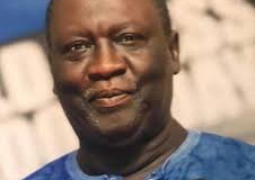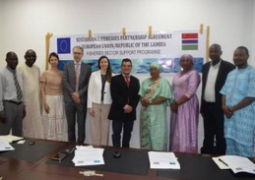
Speaking in an exclusive interview with Eye Africa TV, Dr. Ceesay admitted that the government’s intention has always been to ensure every citizen can access essential services without delay, but challenges with the transition from the previous contractor, SEMLEX, had stalled the process.
“Our intentions are to ensure every service sought by citizens is available to them as long as you are Gambian. However, sometimes our wants and needs do not match the reality,” Dr. Ceesay noted.
For years, SEMLEX operated the ID card system on a build-operate transfer basis. When its contract expired, the process of transitioning to a new system was marred with difficulties, leaving thousands of Gambians without valid identification.
The minister revealed that the crisis deepened because ID card printing requires specialized machines and consumables including a unique ink that provides ECOWAS standard security features. These materials had to be imported, creating supply bottlenecks that stalled printing.
“During that period, people were still applying. So when we finally received the consumables, priority had to be given to clearing the backlogs first before taking on new applicants,” he explained.
He said with fresh supplies secured, the Ministry of Interior has instructed that printing will continue on a 24-hour basis. According to Dr. Ceesay, this decision is aimed at ensuring every Gambian who applied for an ID will soon have one in hand.
Dr. Ceesay also addressed the plight of Gambians residing in Mauritania, where many struggle to secure residence permits, work authorizations, and basic rights. Unlike ECOWAS member states where Gambians enjoy free movement, Mauritania enforces stricter immigration rules.
“The issue in Mauritania is that Gambians need to prove they are indeed Gambians, and the only way to do that is through their national identity card,” Dr. Ceesay said.
He revealed that President Adama Barrow was moved by reports of the difficult conditions faced by Gambians there and dispatched a high-profile delegation, including the Foreign Affairs Minister to engage Mauritanian authorities.
Mauritania, he said, made it clear that for Gambians to benefit from legal residency they must present proper identification. Unfortunately, many Gambians residing there lack national IDs.
To address this, the Gambian government has dispatched a special team to Mauritania to issue IDs to Gambians living there, ensuring they are not denied their rights or left vulnerable.
“The other issue is we can't force Mauritania to grant other people work permits. For work permit to be granted to people who are not citizens of a country solely depends on the state and their conditions you need to fulfill to be granted work permit,” he stressed.
Read Other Articles In Headlines



